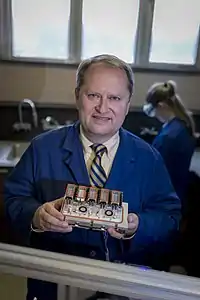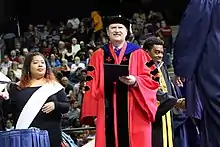John Z. Kiss
John Z. Kiss (born 1960) is an American biologist known for his work on the gravitational and space biology of plants.[2][3] Kiss is dean of the College of Arts & Sciences at the University of North Carolina Greensboro.[4] Previously, he was a professor of biology and dean of the Graduate School at the University of Mississippi.[5] and distinguished professor and chair of the botany department at Miami University.[5] He has worked with NASA since 1987 and served as principal investigator on eight spaceflight experiments on the Space Shuttle, the former Russian space station Mir, and on the International Space Station.[6] His research focuses on the sensory physiology of plants in space. He received the NASA Outstanding Public Leadership Medal in 2014.[7] In 2021, Asteroid Kiss 8267 was named in his honor, a recognition that coincided with his receipt of the 2021 COSPAR International Cooperation Medal.[8] His international collaboration on a spaceflight project with NASA and the European Space Agency has led to the discovery of novel sensory mechanisms in plants.[9]
John Z. Kiss | |
|---|---|
 | |
| Born | Kiss János Zoltán |
| Nationality | American |
| Alma mater |
|
| Known for | Tropisms, Botany, Spaceflight research |
| Spouse(s) | Helen Kiss |
| Awards |
|
| Scientific career | |
| Fields | Biologist, Botanist, Higher Education |
| Institutions | Hofstra University Miami University University of Mississippi UNC Greensboro [1] |
Education
Kiss received his Bachelor of Science degree in biology from Georgetown University.[10] and a Ph.D. in botany and plant physiology from Rutgers University in 1987.[6] His doctoral work focused on biosynthesis of the storage carbohydrate paramylon in the alga Euglena. From 1987–1990 Kiss conducted post-doctoral work on gravitropism in plants at Ohio State University, where he was first introduced to NASA-related research. His first funded project, on gravity perception and response mechanisms, was as a NASA research associate at the University of Colorado at Boulder from 1990–1991.[11]
Personal life

Kiss is married to Helen Guiragossian Kiss, who also received her Ph.D. from Rutgers University and works in higher education research.[12] They have one son, Stephen Vahe Kiss.[5]
Academic career
Kiss’ first tenure-track appointment was as an assistant professor at Hofstra University from 1991–1993. From (1993–2012) he worked at Miami University becoming a University Distinguished Professor in 2011. The following year, Kiss received the Benjamin Harrison Medallion, the highest recognition by Miami University for “extraordinary contributions related to teaching, research, and service”.[5] He has had faculty appointments as professor of biology at the University of Mississippi (2012–16) and the University of North Carolina Greensboro (2016–present) and had an active research laboratory while serving as dean at both universities.[13]
Research
Kiss' research focuses on plants in space, specifically how gravity and light responses influence each other in plants.[14] His work seeks to understand the cellular signaling mechanisms involved in plant tropisms—directed plant movement and growth in response to external stimuli.[15] Early in his career, Kiss focused on the cellular mechanisms that mediate gravitropism.[16][17] In addition, he is interested in how plants adapt to weightlessness and low-gravity environments, which is important for determining the ability of plants to provide a complete, sustainable, and dependable means for human life support in space.[18][17]
Kiss was the principal investigator on eight spaceflight projects on the Space Shuttle, Mir, and the International Space Station. His major collaborators on these space projects included Richard E. Edelmann from Miami University and F. Javier Medina from Centro de Investigaciones Biológicas (CSIC) in Spain.[19] This spaceflight research contributed to the discovery of a novel red-light sensing mechanism involved in phototropism of flowering plants.[20][3][6] Kiss also was one of the first scientists to study plant behavior at fractional or reduced gravity on the ISS.[21][6] Kiss and his coworkers have contributed toward understanding the effects of microgravity/reduced gravity on transcription and gene expression in plants.[22]
Outreach
In 2019, Kiss gave a TEDx talk on the importance of plants for a human mission to Mars.[23] In 2020, he was interviewed on the Interplanetary Podcast and the Orbital Mechanics Podcast to discuss his work as a plant space biologist.[2][24]
Spaceflight missions
Summary of the spaceflight projects flown on vehicles in low Earth orbit with John Z. Kiss serving as the principal investigator:[25][6][26][27][28][29][30]
| Project Title | Year | Topic | Facility | Launched | Performed | Returned |
| PREPLASTID | 1997 | Gravity perception | Biorack-Spacehab | STS-81 | STS-81 | STS-81 |
| PLASTID | 1997 | Gravity perception | Biorack-Spacehab | STS-84 | STS-84 | STS-84 |
| TROPI-1 | 2006-07 | Tropisms; microgravity | EMCS-ISS | STS-121, STS-115 | Expedition 14 | STS-116, STS-117, STS-120 |
| TROPI-2 | 2010 | Tropisms; reduced gravity | EMCS-ISS | STS-130 | Expedition 22 | STS-131 |
| BRIC-16 | 2010 | Plant morphology; gene profiling | BRIC-Space Shuttle Middeck | STS-130 | STS-130 | STS-130 |
| Seedling Growth-1 | 2013-14 | Phototropism; cell cycle; gene profiling | EMCS-ISS | SpX-2 | Expedition 35 | SpX-3 |
| Seedling Growth-2 | 2014-15 | Phototropism; cell cycle; gene profiling | EMCS-ISS | SpX-4 | Expedition 41 | SpX-5 |
| Seedling Growth-3 | 2017 | Phototropism; cell cycle; gene profiling; cell localization | EMCS-ISS | SpX-11 | Expedition 52 | SpX-11 |
References
- "Facts & Figures". Harvard Medical School. Harvard College. Archived from the original on 16 January 2013. Retrieved 7 November 2012.
- "Episode 267: DOWNLINK--John Z. Kiss". The Orbital Mechanics Podcast. Retrieved 2020-07-20.
- "Research underway at UNCG to grow plants on Mars". myfox8.com. 2018-12-05. Retrieved 2020-07-21.
- "John Z. Kiss". UNCG Department of Biology. Retrieved 2020-07-20.
- Smith, Edwin (2012-06-11). "John Z. Kiss Hired as New Dean of UM Graduate School". Ole Miss News. Retrieved 2020-07-20.
- "Lift off: UNCG plant biologist's experiment heads into space". journalnow.com. Retrieved 2020-10-19.
- Harris, Michael D. (2016-03-22). "Dr. John Z. Kiss named Dean of College of Arts & Sciences". UNCGNews. Retrieved 2020-07-20.
- "Committee on Space Research (COSPAR) » International Cooperation Medal". cosparhq.cnes.fr. Retrieved 2021-01-07.
- "Committee on Space Research 2020 Awards Announced". International Science Council. 2021-01-05. Retrieved 2021-01-07.
- "John Z. Kiss". UNCG Greensboro College of Arts and Sciences. Retrieved 2020-07-20.
- Orbiter.ch (2012-11-27). "Orbiter.ch Space News: Why Study Plants in Space?". Orbiter.ch Space News. Retrieved 2020-10-19.
- "Helen Guiragossian Kiss's research works". ResearchGate. Retrieved 2020-07-21.
- Elkins, Chris. "Kiss named dean of UM graduate school". Daily Journal. Retrieved 2020-10-19.
- "To Boldly Grow". UNCG Research Magazine. Retrieved 2020-07-20.
- Kiss, John Z. (2000-11-01). "Mechanisms of the Early Phases of Plant Gravitropism". Critical Reviews in Plant Sciences. 19 (6): 551–573. doi:10.1080/07352680091139295. ISSN 0735-2689. PMID 11806421. S2CID 2704136.
- Kiss, John Z.; Hertel, Rainer; Sack, Fred D. (1989-02-01). "Amyloplasts are necessary for full gravitropic sensitivity in roots of Arabidopsis thaliana". Planta. 177 (2): 198–206. doi:10.1007/BF00392808. ISSN 1432-2048. PMID 24212342. S2CID 3668384.
- "UNCG professor leads NASA experiment Black Business Ink". Retrieved 2020-10-19.
- Vandenbrink, Joshua P.; Kiss, John Z. (2016-02-01). "Space, the final frontier: A critical review of recent experiments performed in microgravity". Plant Science. 243: 115–119. doi:10.1016/j.plantsci.2015.11.004. ISSN 0168-9452. PMC 5739877. PMID 26795156.
- Vandenbrink, Joshua P.; Herranz, Raul; Medina, F. Javier; Edelmann, Richard E.; Kiss, John Z. (2016-12-01). "A novel blue-light phototropic response is revealed in roots of Arabidopsis thaliana in microgravity". Planta. 244 (6): 1201–1215. doi:10.1007/s00425-016-2581-8. ISSN 1432-2048. PMC 5748516. PMID 27507239.
- Millar, Katherine D. L.; Kumar, Prem; Correll, Melanie J.; Mullen, Jack L.; Hangarter, Roger P.; Edelmann, Richard E.; Kiss, John Z. (2010). "A novel phototropic response to red light is revealed in microgravity". New Phytologist. 186 (3): 648–656. doi:10.1111/j.1469-8137.2010.03211.x. ISSN 1469-8137. PMID 20298479.
- Kiss, J. Z. (2014). "Plant biology in reduced gravity on the Moon and Mars". Plant Biology. 16 (s1): 12–17. doi:10.1111/plb.12031. ISSN 1438-8677. PMID 23889757.
- Johnson, Christina M.; Subramanian, Aswati; Pattathil, Sivakumar; Correll, Melanie J.; Kiss, John Z. (2017). "Comparative transcriptomics indicate changes in cell wall organization and stress response in seedlings during spaceflight". American Journal of Botany. 104 (8): 1219–1231. doi:10.3732/ajb.1700079. ISSN 1537-2197. PMC 5821596. PMID 28827451.
- Report, Staff. "Next TEDxGreensboro forum features 14 of Greensboro's thinkers, doers". Greensboro News and Record. Retrieved 2020-07-20.
- Jamie, Matt & (2020-06-25). "#191 - John Kiss - To Boldly Grow". Interplanetary Podca. Retrieved 2020-07-20.
- "NASA Ames to launch science experiments to space station on SpaceX rocket". ScienceDaily. Retrieved 2020-10-19.
- "N-USOC - SEEDLING GROWTH 3". samforsk.no. Retrieved 2020-10-19.
- Kovo, Yael (2017-05-11). "Seedling Growth-3 (SpaceX-11)". NASA. Retrieved 2020-10-19.
- Figliozzi, Gianine (2015-02-18). "Seedling Growth-2 (SpaceX-4)". NASA. Retrieved 2020-10-19.
- Kovo, Yael (2015-02-18). "Seedling Growth-1 (SpaceX-2)". NASA. Retrieved 2020-10-19.
- "NASA - Tropi Experiments". www.nasa.gov. Retrieved 2020-10-19.